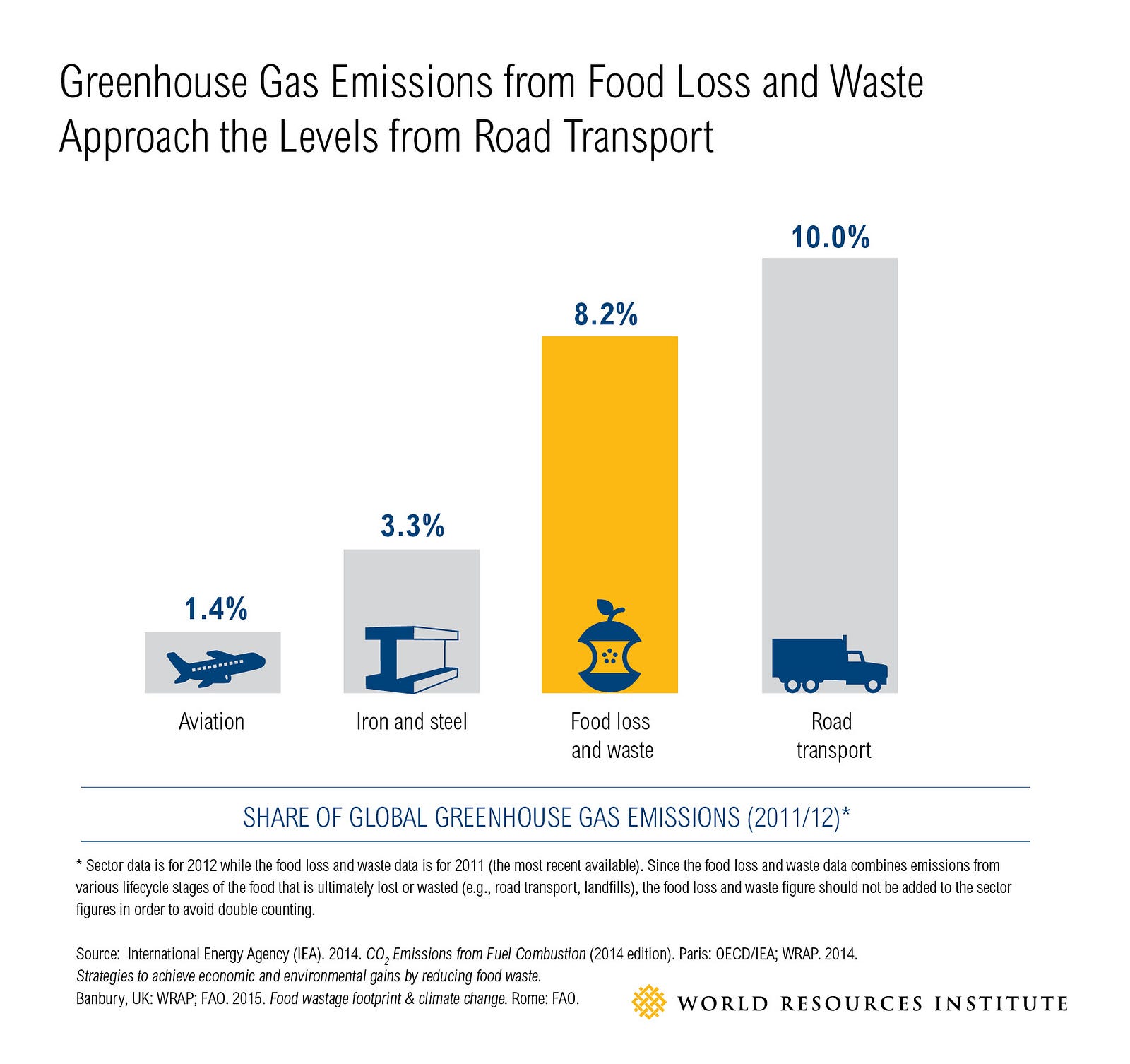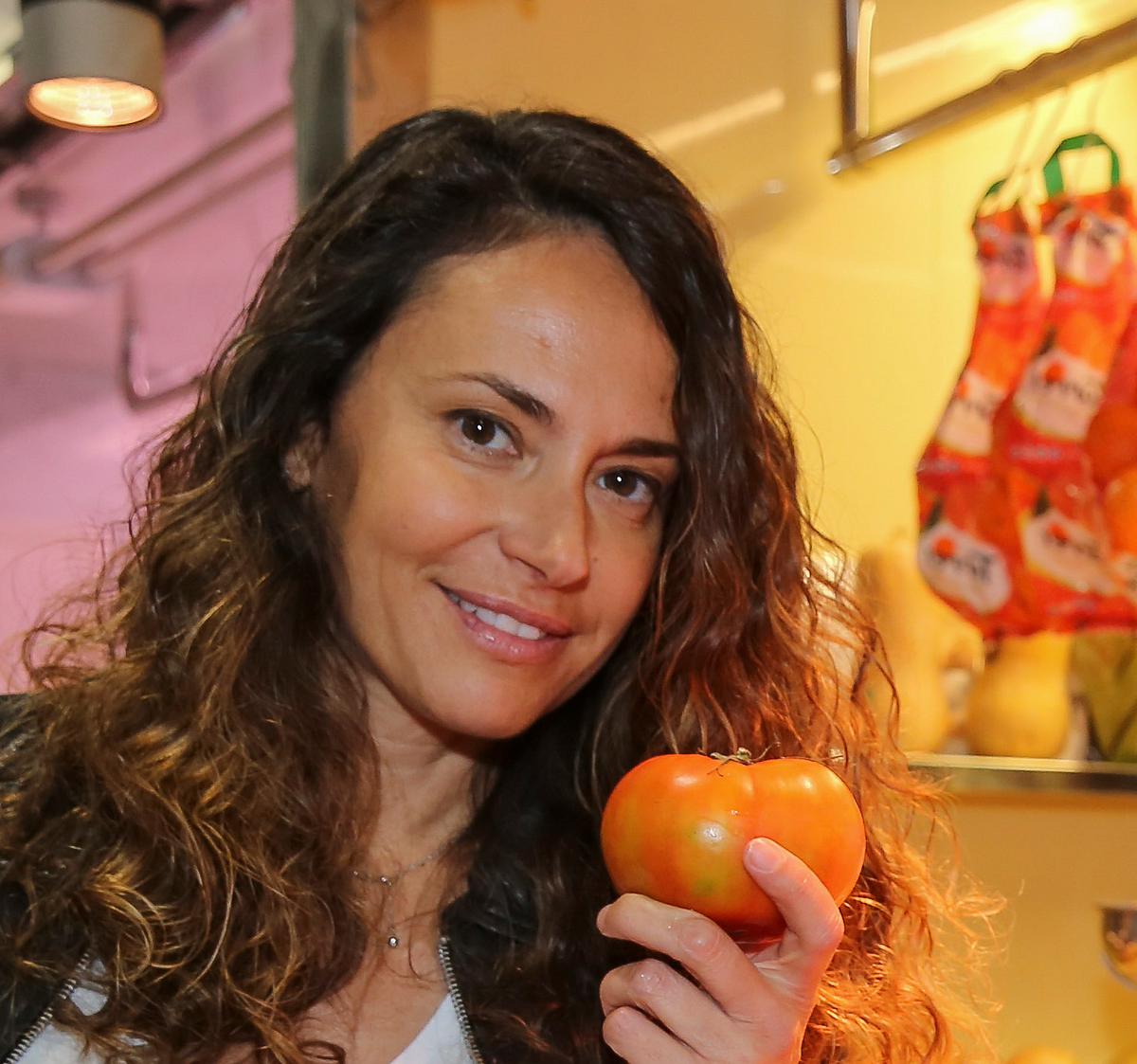
05 Jul How fighting food waste is a low hanging fruit in the battle against climate change
Food waste is a major and unnecessary contributor to climate change. Had food waste been a country it would have been the third largest in the world after China and the US in terms of greenhouse gas emissions. The food system is failing us and the climate but Spain may be stepping up to the challenge.
One way to foster innovation of the food system are food waste hackathons. This article introduces how Spain can combat food waste, resource in-efficiency and climate change. On June 15–16 a food hackathon takes place in Barcelona. Read this to learn about the event. But first, why is solving food waste so important?
World Resources Institute has written about and made these powerful graphics from a FAO report with statistic showing the vast amount of greenhouse gas emitted to no use as a result of food loss and food waste. UN’s Food and Agricultural Organization (FAO) publishes these important data and tools that lay out why you should think twice before throwing away food.

Greenhouse gas (GHG) emissions from agriculture is troublesome and on the rise making reducing it widely beneficial in the fight against climate change. But it has also proven to be a great challenges for mankind to decrease food losses and food waste. Carbon(CO2), methane (CH4) and nitrous oxid (N2O) from food loss and food waste will soon amount to more billion tonnes of GHG than all that from transportation, as illustrated by World Resources Institute. This is staggering and often due to totally unnecessary faults with our current food paradigm.

Also please do check out these graphs with the year by year trends from 1800 up till today from the European Environment Agency.
WeDontHaveTime.org are proud to present to you another important guest writer on our blog. This time it’s written by Diletta Parente of Valueloops in Spain. It reflects the authors personal views.
The possibility of a European food crisis cannot be ignored these days of climate change, social conflicts, energy crisis, trade embargos, sudden and extreme whether events and climate change have increased the food production costs, the agricultural sector and distributional abilities have been put to test and stress more frequently in recent years. Thus even in the richest parts of the world and on a global food market we all feel the heat from climate change when it comes to our basic need for food.
In my personal Climate Resolution I therefore too echo the message of reducing food waste as a low hanging fruit to reduce GHG emissions and save scarce resources. Now please read Diletta Parente’s important statement, share it and when in Spain this weekend – join the hackathon!
Mårten Thorslund, Chief Marketing Officer, WeDontHaveTime.org
The first Food Waste Hackathon in Spain will take place this June 15–16th. The event is organized by Valueloops to offer innovative tools to find solutions to food waste challenges.
Food waste is one of the most disturbing symptoms of the inefficiency of our economic system. It is the consequence of a linear way of producing, distributing and consuming food worldwide. In developed countries the waste is more prominent, we lose a huge quantity of food along all value chains everywhere. This happens such on massive scale that food is now the first cause of environmental pressure on our planet.
From an ethical perspective, there is simply no room for food waste. In the EU alone, around 88 million tonnes of food are wasted annually — 20% of all food produced — with associated costs of an estimated EUR 143 billion. And by doing so we are not only wasting food but also water, energy, and environmental resources, thus increasing climate change.
Thousands of years of human history should have taught us to mimic nature and its perfect cycles where there is no unwanted, but this not the case and waste it is an emergency already. Food waste it is an icon of our society, our relationship with goodies and food, our way of using and disposing everything. The system doesn’t prevent overproduction and overconsumption is the norm.
We do have a cultural problem around food. It is often just perceived as the equal of its monetary value and frequently not related with social, environmental and health values. Cheap food foster overconsumption, that foster food related diseases, that are not inexpensive to the all society and environment.
From many sides, we hear that the solution to a growing population is increasing production: keep on buying and wasting. The amount of food wasted in the world could feed twice all the people that suffer de-nutrition, yet malnutrition still affects populations that have sufficient food available. Should we produce more, forage this distorted system and put more pressure on our environment, or should we think about how to use our resources more wisely and adjust our consumption to real needs?
The problem is enormous. It provides vast opportunities for ingenuity, creativity, and imagination in designing solutions, creating a flourishing food waste innovation scene. What has been for years the main driver of social innovation is now finally troubling board rooms of big companies. At Valueloops we believe that creativity and the willingness of people in power in business can make the difference.
At this point, who wants to have an impact need to go a step ahead? They must find a unique positive role to play in society, something authentic to embed in their operations. Asking themselves what power they have to positively impact their market with their business. At Valueloops, we like to call this Impact Identity where the business strategy, purpose and sustainability intersect.
Advertising as it was done just 10 years ago is now dead. The world needs a bolder, broader value proposition from companies. More and more, this differentiation will happen at the Impact Identity level. Marketing a unique identity will no longer require differentiating from competitors, because Impact Identity will already create a story and coherent narrative around brands. Companies can and should choose a cause relevant to each product and engaging the whole organization around it.
Navigating this scenario in not always easy. It is a process that may require intense resources of time, money, and people. It will engage multiple departments needing informed coordination. These challenges may cause companies to lose momentum in the process.
Our organization, Valueloops was born with the mission of helping organizations make this transition by forging the creation and innovation process.
For this reason, we created the Food Waste Hackathon (FWH). It is a co-creation innovation framework, offering corporate sustainability via fighting food waste. The design of the FWH puts in place a design for CSR on a shorter timeline, saving companies the intense resources they would otherwise spend to arrive at a refined plan.
The Food Waste Hackathon is an intensive, immersive and interactive event designed to fight food waste with creativity and innovation. A sponsor organization brings its food waste challenges to the table. We provide them with the ideal environment to explore and solve the problem with radically innovative project proposals.
We work in teams of up to eight people, engineering a mix of representatives from the sponsoring company as well as other experts who can bring their experience, brain power and fresh perspectives to generate and develop innovative solutions.
We create a unique climate that nourishes creativity and maximizes the expertise of the professionals and participants we bring together. Hackathon facilitators design a collaborative process that produces truly novel ideas. These ideas are prototyped to make them concrete and actionable in a compressed timeline.
Facilitation is a critical aspect when it comes to efficient dynamics. The outcome is a tailor made, vertically integrated food recovery solution to food waste challenges.
Implementation is guaranteed by the creation of a ready-to-use prototype, a front-line team, and a 100-days implementation plan supervised by Valueloops.
We expect to see different projects: resource efficiency improvement, enhanced design, new business partner possibilities, streamlined processes. All those drivers can add a significant value to participating brands and create more sustainable versions of their businesses.
We don’t want to export staid solutions, on the contrary we unlock each group’s creativity to highlight and integrate the talents already within each company and help them create a bolder value system around CSR.
We can´t solve food waste challenges by staying within the same mind-set that created it, Valueloops strives to engineer a new environment where creativity and collaboration can spark truly divergent solutions.

Diletta Parente, Founder & President of Valueloops
Twitter: @DilettaParente
Web site for the Hackathon event: http://valueloops.org/food-waste-hackathon/and for Valueloops: http://valueloops.org/
Facts about WeDontHaveTime
We Don’t Have Time is currently building the world’s largest social media network for climate action. Together we can solve the climate crisis. But we are running out of time. Sign up for our newsletter from WeDontHaveTime. Join the movement by reading our manifest, follow the blog, take action or simply just enjoy seeing our impact and reach here.
Web site: wwww.wedonthavetime.org

